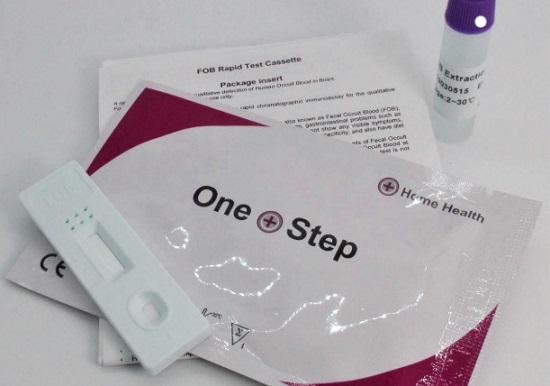Nikhil Prasad Fact checked by:Thailand Medical News Team Jul 06, 2025 7 months, 1 week, 20 hours, 36 minutes ago
Diagnostics and Biomarkers: In a groundbreaking step towards affordable and accessible healthcare, scientists at the Massachusetts Institute of Technology (MIT) have developed an innovative disposable DNA sensor that can identify dangerous diseases like cancer, HIV, and HPV—all from a simple sample such as urine, saliva, or a nasal swab, and at the incredibly low cost of just U.S. 50 cents. This
Diagnostics and Biomarkers news report explores how this invention could change the landscape of medical diagnostics, especially in poorer communities or regions without reliable access to clinics and labs.
 Revolutionary 50 Cent Test from MIT Can Detect Cancer and Viruses at Home
Revolutionary 50 Cent Test from MIT Can Detect Cancer and Viruses at Home
At the heart of this technology is a clever use of DNA and CRISPR-based enzymes to create a simple, low-cost diagnostic tool. Unlike traditional diagnostic machines that are bulky, expensive, and require refrigeration, this new device is small, stable, and portable. It uses a strip of gold leaf laminated onto plastic and coated with DNA strands. These DNA-coated electrodes are capable of detecting specific disease-related genetic material, including markers for prostate cancer and certain infectious diseases. According to the studies conducted, the sensors are so stable that they can last for months—even in hot environments—without any need for refrigeration.
How the Test Works
The new sensor relies on electrochemical detection, a technique already used in popular blood glucose meters. When a user adds a sample—such as urine or a nasal swab—the sensor looks for a specific DNA or RNA sequence linked to a disease. This is done through a powerful gene-editing protein known as Cas12, a cousin of the well-known Cas9 used in CRISPR technology.
Cas12 is paired with a guide RNA that can be custom-designed to recognize any target genetic sequence. Once the target is found, Cas12 springs into action, cutting nearby DNA indiscriminately. If the sensor detects this cutting activity, it registers a change in electrical current, giving a clear signal that the disease marker is present.
The key to making this technology practical was solving a long-standing problem: the instability of DNA on sensors. Typically, DNA breaks down quickly and has to be applied just before use, making storage and transportation nearly impossible. But the MIT team discovered that a simple and affordable polymer called polyvinyl alcohol (PVA) could solve the issue.
The Power of a Protective Polymer
PVA, which costs less than one cent per test, acts like a tarp over the DNA. When dried on the sensor, it creates a barrier that shields the DNA from harmful elements like heat and reactive oxygen. In tests, the polymer coating kept the DNA stable for up to two months and at temperatures as high as 150 degrees Fahrenheit.
When the sensor is ready to be used, the polymer is easily washed off. The researchers demonstrated that even after long storage, the sensor could successfully detect PCA3, a gene linked to prostate cancer.<
br />
Potential for Global Health Impact
The research was led by Ariel Furst, Assistant Professor of Chemical Engineering at MIT, with contributions from MIT graduate student Xingcheng Zhou, undergraduate Jessica Slaughter, alumna Smah Riki, and graduate student Chao Chi Kuo. The study was funded by the MIT Research Support Committee and a MathWorks Fellowship and published in the journal ACS Sensors on June 30.
https://pubs.acs.org/doi/10.1021/acssensors.5c00937
Their goal is to democratize diagnostics—making it possible for anyone, anywhere, to check for diseases without needing a clinic, a lab, or even a refrigerator. “People wouldn’t even need to be in a clinic to use it. You could do it at home,” says Professor Furst.
The team is now part of MIT’s delta v student venture accelerator, where they are preparing to launch a startup to bring the technology to market. With longer shelf life and temperature resistance, these sensors could soon be shipped to remote or resource-limited areas across the world for use in real-life settings.
Looking Ahead
The implications of this invention are vast. It could make early detection of diseases easier, cheaper, and more widespread—helping to reduce mortality by catching illnesses before they become severe. It also represents a significant step in overcoming medical inequality by delivering advanced diagnostics to underserved populations.
However, for the promise to be fully realized, the next hurdle will be ensuring that these low-cost sensors are distributed fairly and responsibly. Challenges such as logistics, public awareness, and regulatory approvals will need to be addressed to make this revolutionary tool truly global in impact.
With innovations like this coming out of institutions like MIT, the future of healthcare looks brighter and more inclusive.
For the latest on
Diagnostics and Biomarkers, keep on logging to Thailand Medical News.
Read Also:
https://www.thailandmedical.news/news/study-alarmingly-finds-that-ct-scans-are-possibly-triggering-the-onset-of-cancers
https://www.thailandmedical.news/news/many-in-the-united-kingdom-struggle-with-health-issues-but-lack-clarity-on-long-covid-due-to-insufficient-diagnostics
https://www.thailandmedical.news/news/africa-cdc-warns-that-current-mpox-lab-diagnostics-and-tests-are-unreliable-due-to-high-false-negatives
